#if you have any thoughts please add on
Text
Thinking about how Diavolo’s feelings transcend time and how in the Nightbringer UR+ card Demon Lord’s Castle Tour this conversation happens.
When asked, “Do you wish to see your father?”
Diavolo responds:
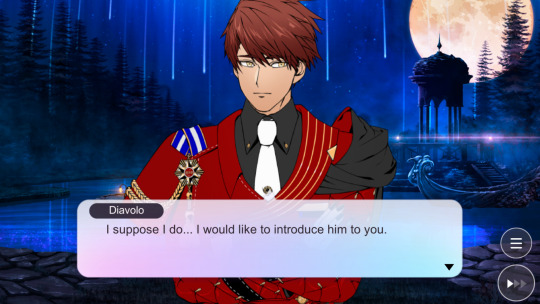
“I suppose I do . . .” isn’t the typical reaction to how a child would feel about wanting to see their parent. Especially when said parent has essentially been in a coma for a year.
Along with how Diavolo describe his father.

It makes more sense why when you learn in Lesson 56 how Diavolo was treated by him growing up.




Diavolo can tell when others are lying but is unable to understand his father’s intentions.
Diavolo mentions that he lived a very sheltered life growing up. That from a young age his father never allowed him a chance to talk to anyone outside the castle.
His childhood friend was Mephistopheles. A demon literally RAISED to be his friend. Putting a barrier between the two because Mephistopheles would put Diavolo on a pedestal.
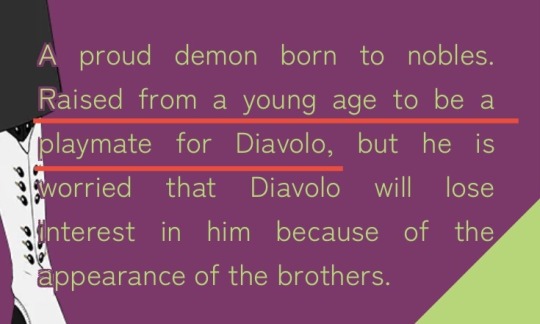
The isolating childhood he experienced riddled with his strict father constantly scolding him.


Despite everything MC is so important to him he wants to see his father again so we can meet.
#Demons and Humans can’t get married even in the present so it adds an extra layer him wanting to introduce us.#There’s a lot more you could add onto this (please do I’d love to hear other’s thoughts).#Like how Diavolo’s childhood affected him just look at the way he describes himself:#“The truth is I am a child in a way. A child who spends his time alone and never gets to do anything interesting.”#A lot of Diavolo’s poor behavior while not excused comes from his childhood.#How Diavolo admits to using his position to force others to do what he wants. Along with how he doesn’t like sharing.#Diavolo’s insecurities in his friendships with others.#Mainly Lucifer and Barbatos which makes sense with how they happened.#IE Forcing Barbatos to become his butler and the oath/deal with Lucifer regarding Lilith.#It’s clear Diavolo is very lonely and carrying a heavy burden.#I like that MCs presence is helping him change into a better person.#Also I don’t think Diavolo hates his father their relationship just isn’t good and very complicated.#Diavolo is such a wonderful character if you have any in-depth posts about him please tag me I’d love to read them!!!#I AM FILLED WITH SAPPY THOUGHTS ABOUT DIAVOLO TONIGHT!!!!#Obey Me#Obey Me Spoiler#Obey Me Nightbringer#OMSWD#Obey Me Diavolo#Diavolo#MaddyMajolish#Is it obvious I can’t sleep because I’m riddled with Blorbo thoughts
5K notes
·
View notes
Text
We need to remember that Shubble stated that Wilbur would manipulate and gaslight friends and family. With this, we must be patient with streamers that were close to Wilbur. This was likely surprising and shocking for them. They may need time to come to terms with what has happened.
I have been vocal about how important it is for men to be critical about abusive behaviors. However, Wilbur had many close friends—some would even consider him family—and now they may feel they hardly knew him at all.
There is a deep stress felt by viewers. It is difficult to think we have given any amount of time or money to an abuser. Could you imagine a close friend right now? The pain and betrayal must sear. They need time to understand what has happened and come to terms with it. Many of them may not be live in the coming days (weeks even).
That being said, as time passes, criticism may be necessary. Complacency is not an option. Men that are willing to ignore abuse to protect an abuser are just as pathetic as the abusers themselves.
Let's give this situation time to breathe. I ask that we give patience and courtesy to those close to Wilbur at this time. But please do not forget that this happened. There may be a few streamers hoping to lay low and then drop a collab in a few months. Do not let them. This is too important.
#for now#the best thing we can do is spread awareness about abuse and offer support to domestic violence victims#i also want to add#that any previous art made about him was made with pure intentions#obviously its up to each individual to decide where the line is#but maybe lets not support him monetarily moving forward#that seems to be the move#anyway#please be kind to each other and give each other space#especially domestic violence survivors that may be here with us#and those who may have realized they were/are abused from shubbles story#i want to offer her and everyone around as much support as i can#if any domestic violence survivers have any stories they want to share#my dms and askbox are open#if anyone suspects that someone in their life may be abusing someone#this offer is open to you too#we need to talk about this#thoughts of dante#wilbur soot#shubble#im tagging this under shubble even though the post isnt really about her but i want the tags of this post to reach#whoever needs to read them
874 notes
·
View notes
Text
Hello! this is your very friendly reminder that Wylan Van Eck probably plays a flute like this:
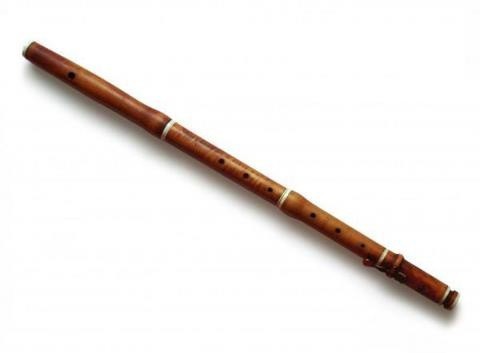
And not a flute like this:

The first picture is a flute from the baroque period of music, which was during the 1600 - 1750s. Wylan is seen playing this type of flute when we first meet him in Shadow and Bone Season 2.

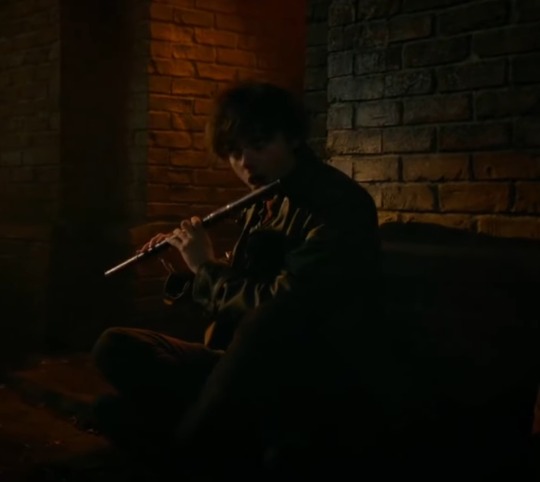
#this is up for interpretation ofc#please add any extra information if you have any#just thought this was cool#six of crows#netflix shadow and bone#shadow and bone season two#six of crows duology#shadow and bone netflix#shadow and bone#shadow and bone s2#wylan van eck#wylan hendriks#wylan van sunshine
201 notes
·
View notes
Text
a ramble about arthur's relationship with dutch and hosea
haven't used tumblr in a while (let alone made an actual original post in who knows how long) but i can't stop thinking about that one interaction between dutch and arthur in lakay. specifically: "you sound like hosea." it breaks my heart, because dutch is right in saying that. as chapter six unfolds into the tragedy it is, arthur becomes more and more like hosea, and just like hosea, arthur tries and tries and fails to get dutch, stubborn and single-minded, to see reason.
one of my favourite journal entries, is where arthur says, "i love dutch like a father, but in many ways i love hosea more." arthur loved hosea. hosea saw arthur for who he was. knew arthur wasn't near as dumb as he liked to pretend he was. one of my favourite interactions between arthur and hosea is early on in chapter 3, very shortly after they get to clemens point. arthur walks by hosea sitting at a table, who calls out to arthur and asks what he thinks about dutch's plans. arthur's response is "you know me, i never did much thinking." to which which hosea says one of my favourite lines in the game, and it's a line that gives far more insight into arthur, hosea and their dynamic than you might first think.
dutch was arthur's father in a more abstract way. whether it was dutch's intention or not (and i believe, at the very least, it was later on), i always found his "you're like a son to me" comments to arthur to be very manipulative in nature, meant to reel arthur back in when he's concerned he's "getting away," so to speak. i have personal experience with men trying to get me on their good side by saying i'm like a kid to them, and maybe i'm projecting a little because of that, but the way dutch says that to arthur triggers the same alarm bells in my brain.
again: "i love dutch like a father, but in many ways, i love hosea more." say what you want, but hosea was arthur's true dad. he was his dad in all the ways that mattered. hosea knew arthur so well, he knew arthur was putting on "an angry moron act." in the video i linked, he sounds genuinely frustrated when he continues saying "but it's a thin enough veneer." he knows arthur is capable of more. is capable of being better, and i think hosea knew that things were doomed in the end, whether or not he would admit it.
arthur spent a lot of time, both early in the story and at the end, reflecting on what was happening, on himself, on the other gang members. i like to think he was unconsciously channeling hosea in chapter 6. honestly, the parallels are kind of painful. maybe that's, in part, why dutch was so adamant on not listening to arthur; because he reminded him, painfully, of hosea, his oldest and dearest friend. of course, that's not the only reason, but it makes sense, doesn't it? arthur is so much like hosea, and we see that more and more as the story progresses.
#of course i should mention that i wrote this with high honour arthur in mind as not only is that my preferred way of playing#i also perceive high honour arthur as the canon story#red dead redemption 2#rdr2#arthur morgan#hosea matthews#dutch van der linde#please feel free to add your own thoughts if you have any#i'd love to hear other people's opinions#this was just me wanting to get my thoughts out lol so apologies if it's not the most coherent
107 notes
·
View notes
Text
"Rule Britannia is out of bounds" - How England invented Great Britain
("Rule Britannia is out of bounds"- Life on Mars, David Bowie, 1971)
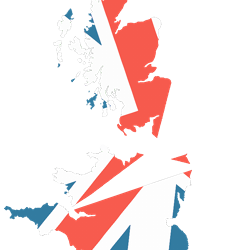
As promised, here is a more in-depth exploration of Wales' relationship to indigeneity or colonised status. And how England created the (political) concept of Great Britain when it formally annexed Wales in 1542. This is a long post but I will try and be brief where possible to do so. I graduated with a degree in Celtic Studies last year from Aberystwyth University so it's time to put that to use.
In my last post, I went over the groundwork for this conversation - so if you haven't read that one yet I strongly suggest you read that one first then come back to this one. In that first post, I establish the stickiness in claiming or applying the status of colonised onto the modern nation and people of Wales. I also explore how claims of indigeneity (intended to legitimise Welsh nativism through dubious claims of descent from the Iron Age Britons) are weaponised in modern political contexts.
With all that said - how does one categorise the suffering of Wales/its culture and language without straying into the language of the colonised?
Early Medieval English Imperial desire for Wales:
Very often, you will hear people make the claim that Wales was 'England's first colony' and that the other nations bordering England were guinea pigs for Britain's later colonial empire. My previous writing on this topic has established the difficulty in applying colonised as a term to Wales and its context. Which leads to the question of what do we describe it as instead?
For this, we need to make a distinction between colonialism and imperialism.
The two concepts are very similar (and do overlap slightly) but they have crucial differences which allow us to be more precise and succinct with our wording which aids both communication of the subject and quells misunderstanding through language which doesn't fit the situation.
Put simply, Imperialism is when one country, people or nation desires to extend power over another (usually a close-by or neighbouring territory) - especially (but not solely) through the means of expansionism.
Colonialism is also when a country, people or nation wants to extend power over another - but primarily through invasion and typically (but not always) against territories that are further afield and not immediate neighbours).
A lot of the way in which we view early British history in Wales is tinged with a kind of exceptionalism for what happened between England and Wales. Very often, what was done is framed as uniquely terrible for the time and held up as a poster child for the unique evil of England's expansionist desires. Yet all over Europe at the same time this was happening - other European nations and peoples were engaging in the same subjugator-subjugatee relationship. The exceptionalism present in framing Wales as uniquely suffering in this period is, unfortunately, borne out of the same British imperial culture which was thrust upon it and has become irrevocably entwined with culturally. It is a kind of British arrogance (which ironically crops up in anti-British arguments in Welsh independence activism) which presupposes nobody could have suffered the same or worse than they have, which demands the active ignorance of other, contemporary examples of that which they claim to oppose.
Wales was the first victim of English (later British) Imperialism - not its first colonial victim.
The build-up to and annexation of Wales by England:
Wales was annexed twice - once before the age of states and once shortly before that age dawned. The concept of states (as in, sovereign countries) didn't really exist until after the Treaties of Westphalia (1648). In which the concept of non-interference in the religious affairs of other countries (and other domestic affairs) was established and international relations was born. This is relevant to Wales' situation - as what England did to Wales happened long before the age of states began.
There was the Conquest of Wales by Edward I between 1277 and 1283. (Before that, the Norman Conquest of Wales by 1081). (However, the latter being conducted by the Normans is not necessarily equatable to the actions of England the country, which itself had only just been invaded by the Normans). And then the Laws in Wales Acts which formally incorporated Wales into the realm of the Kingdom of England in 1542.
The Conquest of Wales by Edward I overran the territories of the last Prince of Wales (from the Welsh monarchic tradition), Llywelyn the Last and divided the territories into Welsh Principalities and Marcher Lordships. This setup remained until 1542, when Henry VIII passed the Laws in Wales Acts and formally annexed Wales and made it (in all the legal senses) a part of England.
By the time international relations was in its infancy (i.e. shortly after the Peace of Westphalia) Wales had been absorbed into England for just over 100 years. The relevancy of this is that Westphalia had been about religious liberty - Henry VIII's incorporation of Wales into the Kingdom of England was partly informed by religion. Henry VIII had just broken away from Rome and established the Protestant Church of England, whereas Wales was still largely Catholic. The Laws in Wales Acts also replaced the language of the courts in Wales with English, cutting off monolingual Welsh speakers from legal representation. The language of worship became English instead of Latin. Wales was culturally assimilated into England over a long period of time. And that meant ensuring Wales followed the 'correct' religion and spoke the 'correct' language. After the Peace of Westphalia, these actions by Henry VIII to bend Wales to his new religion and to assimilate Wales into England would have been in poor taste or decried in light of the new Westphalian system that was developing in Europe. Alas, these events took place before then and temporally speaking, Wales was locked out of this recourse.
By contrast, Scotland was unified with England into the Kingdom of Great Britain in 1707 (after the Peace of Westphalia). England committed numerous acts of cultural erosion and destruction against Wales and Scotland at this time - but its Union with Scotland differs to that with Wales. Wales was incorporated into England, whereas Scotland was 'invited' to join a union between England (which then included Wales) and itself. Simplifying it greatly - like a marriage proposal in which the two spouses are *supposed* to be equals. After the Act of Union with Scotland, the whole island of Great Britain was 'unified' and thus the Kingdom of Great Britain was formed from two states - England (inc. Wales) and Scotland into one state.
Welsh Nationalism and Nationhood as separate from Statehood:
Wales and Scotland were the victims of English imperialism in many similar, but also many different ways.
Wales, having never been a 'state' was unable to acquire this status since it had long been incorporated into England by the time the concept of states had developed. Wales was unlucky in this way, because other nations on this island such as Scotland had managed to establish themselves long enough to survive into the age of states and thus became one. Because of this, Welsh nationalism cannot look to an era in which it was a free state because that did not happen. Instead, Welsh nationalism very often looks back with rose-tinted spectacles to Wales prior to Edward I's conquest and/or prior to Henry VIII's Laws in Wales Acts.
But nationhood and statehood are not the same thing - and it is the conflation of these two concepts (like the conflation of colonialism and imperialism) which has led to much of the confusion on these topics. Nationhood is acquired by a group of people who share several of these things: a common language, history, culture and (usually) territory. Not all of these things are required, but most nations have all or almost all of these qualities. Wales has a language (Welsh), a common history, culture and territory (Wales). Statehood is acquired by an association of people who have most or all of these things: formal institutions of government, laws, permanent territorial boundaries and sovereignty. Wales before 1283 very loosely had government and laws (monarchy and Laws of Hywel Dda) but had no permanent territory due to the conquest and lost some sovereignty in 1283 and total sovereignty in 1542.
Even if Wales had met all the criteria for a state in 1283, it would not have been eligible to become one - no nation in the world was able to do that yet because the concept (or proto-concept) for it would only be invented in 1648. Even England did not qualify for state status yet. Put simply, Wales got very unlucky with history and geography in such a way which prevented it from having a historical statehood post-1648 like neighbouring England and Scotland.
Naturally, when Welsh nationalism attempts to recall a past in which it was a 'state' - it is always an imagined and romanticised history. A fantasied history which generates ideas of the persecuted 'indigenous' Cymro where it shouldn't really be (in all seriousness, the injustices inflicted upon Wales by England are enough - extra additional injustices reliant upon a claim to to 'nativeness' do not need to be invented in order to be taken seriously). In the modern world, claims of nativeness in a European context are fraught, misguided, in poor taste and often copy the homework of the indigenous peoples those same European powers marginalised or colonised. In the modern world, a white Welshman claiming indigeneity is doing so in a postcolonial world and there really is no escaping that. Succinctly - the Welsh nationalist who relies upon a created sense of nativeness can only do so by drawing upon the work of marginalised native peoples living in parts of the world formerly colonised by Great Britain. To claim native status as a Welshman is to misunderstand and misappropriate history while wielding the language of the genuinely colonised while contributing nothing to it. It is purely extractive and a slap in the face of non-European native peoples everywhere. The pining for this return* to a prior point in Wales' history where it was a fully functional, sovereign nation populated only by 'native' or 'indigenous' Cymry is an alarming and ahistorical fantasy that all too easily slides into ethnonationalism and nativism -ancient or modern.
(*the choice of the word 'return' here is no accident - the desire to 'return' is inextricably linked to the alt-right dogwhistle 'retvrn' and it it is frighteningly common to see elements of that subculture crop up in Welsh nationalist calls to return to a point in Wales' history where it was 'sovreign'.)
Welsh nationalism which isn't vigilant to this kind of thinking very often will find itself arguing blatant untruths. For example, on the milder side of fake history, I've come across Welsh nationalist groups claiming symbolism from Owain ap Gruffydd's coat of arms - despite the fact he lived before the age of heraldry and he never used these arms because they were attributed to him later.
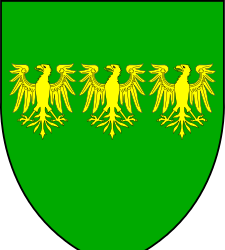
What next for Wales after 1542?:
Since Wales was fully and formally incorporated into the Kingdom of England by 1542, English colonisation of the Americas prior to 1707 naturally included Welsh colonists as well as English colonists. After 1707 Scots joined in with the now British colonisation of the Americas (both as/for/on the side of the Brits and as Scots fleeing Scotland after the Act of Union decimated Scottish Gaelic traditional culture). The Welsh, on the other hand, were more intimately involved with the colonisation of the Americas before that.
Though England spearheaded its colonisation of the Americas, Wales was not an unwilling participant dragged along by its association with and incorporation into England - Welsh colonisation, like Scottish colonisation, was often motivated by religious or cultural persecution - of which colonisation of another land was a possible solution to cultural loss in their home countries. Pennsylvania was settled by many Welsh Quakers and the idea of a Welsh Tract was floated to the Welsh settlers in 1684. The idea was to create a county which would operate in the Welsh language and serve as a vehicle for the preservation of the Welsh language. This attempt was not as successful as Wales' colony in Patagonia, Argentina in which native populations there were displaced at the behest of the Argentinian government - who needed the land settled and cleared. Welsh colonists took up this mantle and created Y Wladfa colony there in 1865.
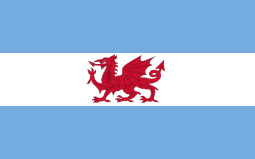
Returning to the 17th Century - Welsh people were active colonists in the Americas during this time - motivated by saving the Welsh language and freedom of religion (especially the developing Nonconformist denominations of Protestant Christianity developing at this time). It was not so much that England was forcing Wales to participate in its colonialism, but that Wales has its own wants and ends for colonialism and was motivated entirely on its own grounds.
Back at home, Wales was still hard-done-by due to England - but two things can be true at once. Wales was a victim of English imperialism, but was also a perpetrator itself of colonial violence against Native Americans. England was no such victim of imperialism of any kind and the power dynamic for England had always been one rooted in absolute expansionism.
Summary and Conclusion:
With all of that said - if you were to ask point blank if I feel it is appropriate or okay for Wales to claim it was colonised by England and that Welsh people are in some way, more indigenous to the island than any other people living here - my answer would be no, I don't think it's okay.
I can't stop people from thinking otherwise, but I can reason that perhaps we shouldn't appropriate the struggles of people marginalised by the very nation we are talking about in order to craft a victimhood which is entirely unnecessary. Wales was a victim of English imperialism - but Wales was also an active colonising European nation. In the modern world, people are thankfully more willing to listen to the wants and needs of victims of colonialism - particularly victims of British colonialism in the Americas, Oceania and Asia. But I would warn against Welsh nationalism which seeks to capitalise on that increase in indigenous visibility in order to add legitimacy to itself (necessitating the crafting of an 'indigenous' narrative which did not exist there before). We live in the modern world where indigenous peoples are being taken more seriously than in centuries past - but that does not mean the only peoples hard-done by being taken seriously are colonised indigenous populations.
I believe it comes from a deep seated insecurity within Wales in which it is not uncommon to feel like Wales is being left behind because of all of this advancement. And this insecurity manifests as rejection of anything not obviously Welsh or demonstrably 'home-grown'. It's the national equivalent of a survival mechanism - but this is detrimental not only to the cause of Welsh nationalism, but to Wales itself. I've had people say to me (and I have read in historical sources from the last 100 years in Welsh) that the LGBTQ+ movement is actually an English invention created to erode Welsh traditional culture. Or variations on that rhetoric in which it is immigrants or other minorities which are made into this boogeyman come to destroy Wales and all Welsh ways of life. And it is so demonstrably not true but also bitter to see from the hearts and minds of my fellow Welsh speakers/Welsh people. Who have been hurt so much by the historical erosion of their culture that they confuse non-threats for threats and can only resolve to obtain some more legitimacy by appropriating the language of nativeness and colonisation in this ever changing world which, right now, is listening to native peoples for once.
It's difficult to put into words, even with all of the background knowledge above - but Wales is valuable and legitimate all on its own and doesn't need to rely upon things which isn't serving it - like ethnonationalism and nativism.
I want to live in a Wales which is uncompromising not only in its own fight for recognition and respect - but for other nations and peoples' fights for the same as well. I want to live in an independent Wales which is an ally to all those who share Wales' struggle and a Wales which rights the wrongs of its past without hesitation or compromise.
Would you rather a Wales for the few or a Wales for all who call it home?
#cymraeg#welsh#wales#cymru#ethnonationalism#cymblr#nativism#indigenous#native#indigeneity#nativeness#tags for relevance#celtic nations#celticist#I know there's so many more things I could say or could add but this post is so long already#granted it's evidence this conversation sorely needs to happen#so if you have any additions or thoughts please reblog or reply in the tags#and reblog this post so that more people have a chance to read it#diolch pawb#long post
133 notes
·
View notes
Text
hello, hello! I have sort of an idea/rant/question.
(about the whole Patton casting the "Dark Sides" out thing.)
so, like, did he?
because obviously, it'd make sense if Thomas' Morality disapproved of Deceit and Dark Creativity, but,,,
in Can Lying Be Good?, it's explained that Janus kept everyone's "mouths shut" about himself and Remus.
and in Dealing With Intrusive Thoughts, Remus sings about how Janus basically sent him off to fuck with everyone.
and Patton was VERY clearly offset by Remus' appearance. (i mean, come on.)
but in Can Lying Be Good?, the very episode that introduced the concept of the "Dark Sides", Patton seems super unaware of what's going on. and when he sees Janus (who's in his spot), he really isn't surprised to see him at all. just sorta oblivious but confused? but i'm guessing Patton understood that it was Deceit, because when Thomas worried about Janus calling him a good person, Patton realized that meant Janus tried telling him that he wasn't.
still, though, Patton didn't really hate that Janus kept appearing. he was just always the one to be challenged. and he definitely aimed that anger from his own actions at himself. (i mean, it led to him turning into a buff video game frog, so..)
and if Patton was the one to have hidden the "Dark Sides", how?
and how come Virgil was able to appear?
i dunno, something about Janus controlling when the Sides can talk about them sorta throws a wrench into this.
#please please add on to this if you have any thoughts!#open to all criticism!#i'm just a tad confused#but that's just the norm#sanders sides#patton sanders#ts patton#janus sanders#ts janus#remus sanders#ts remus#virgil sanders#ts virgil#thomas sanders#c!thomas
59 notes
·
View notes
Text
List of RWRB Questions to Ask the Boys
I don't know if I can make this a thing but I wanna try
I'm curious, especially since with the strike we didn't get any interviews or panels where the boys could talk about RWRB, but what questions about the movie would you guys want to ask Taylor and Nick?
I'll go first:
What scene was emotionally the most difficult to film?
What scene was the hardest to film in terms of technicality?
What's your favourite line?
What were rehearsals like? What did you do during rehearsals?
What do you think was the moment your character started to view their relationship in a different light?
What scene took the most takes?
Is there a scene or a line that you can still remember how to perform to this day?
What's your favourite blooper moment?
Was there a book moment you were really proud to bring to life?
Is there a book moment not in the movie that you think would have been interesting to perform
I think I'll leave this here for now? Definitely will update more if I can think of more
If you have any questions please do add them!
#rwrb#red white and royal blue#rwrb movie#taylor zakhar perez#nicholas galitzine#firstprince#alex claremont diaz#henry hanover stuart fox#henry fox mountchristen windsor#rwrb thoughts#i don't know if we'll ever get the chance to ask them these questions but fingerse crossed#we were really robbed 😭#i just really want to hear the boys talk about this movie that they worked so hard on#they deserve to talk and celebrate it with us#please do add questions if you have any I would love to see what we're all curious about
93 notes
·
View notes
Text

> FERDINAND II.
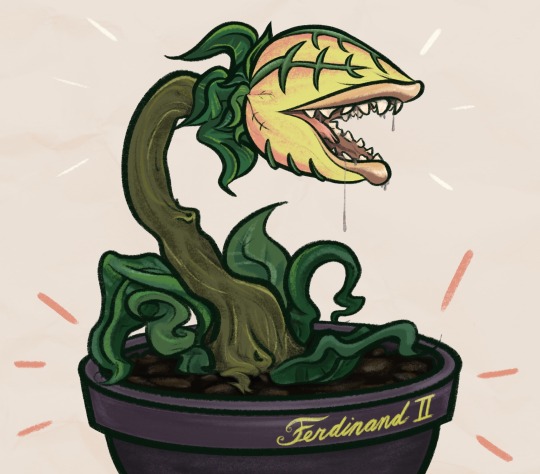
And so your PLANT shall henceforth be known as FERDINAND II.
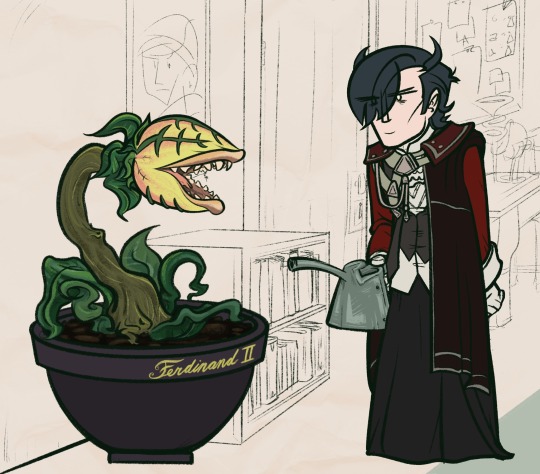
The thought of needing to inform FERDINAND I of his having a namesake makes you a bit ill, but you are already hard at work devising several plausible excuses for the gesture. Something about how you've named it after the one most invested in its naming, or how it is similarly prone to drooling. Yes. Yes, you will be able to deflect quite easily, should the need arise. It has nothing to do with your fondness for FERDINAND or your desire for a substitute in his imminent absence, no—again, you are not so prone to sentimentality. It's about the drool.
Well, anyway. Best to move on with your day and think about something else, lest you grow maudlin or cultivate further affection for the PLANT. May the GODDESS be merciful and never cause you to develop inclinations that could be described as paternal.
Now that your plant has received sufficient care, it is time for COFFEE. You set to making your morning brew. By CHANCE, there happens to be sufficient water remaining in the kettle for FERDINAND I to have TEA, should he wish it.
Per your TIMEPIECE, it is now a quarter to eight. You have made excellent progress on your PRE-BREAKFAST TO-DO LIST thus far: the only remaining task is to remove FERDINAND. You are starting to get rather peckish and would like to be rid of him quickly, but over the past week, you have found that extracting the man from YOUR QUARTERS is a more arduous task than it ought to be.
#007 | < | JOURNAL | HOW TO PLAY | SEE ALL POSTS
#fire emblem#hubert von vestra#fe16#ferdibert#hpnd#sterge.pptx#fe3h#sorry this was late lol#late according to the update schedule i don't have#as the poll was wrapping i thought 'wouldn't it be fucked up to make a game where you make coffee.'#never mind that 1. i've barely made any games#2. i had no idea how to make a multi-part game#3. i wanted to turn it around in ~24 hours#i actually Did finish the game in about a day but i still had to write a post and draw the bg + the panel#if the game doesn't work: sorry#it Should work on mobile (android and ios) but it is pretty finicky#it works Better on desktop but that's not saying much#if you run into any showstopping issues: please lmk so i can fix it#did Some bug testing (aka made my friends do it for me) but not a lot lol. again: short turnaround time#i know there's a bug with the message/alert windows if you click through things too fast but idk what i did and i don't really care lol#maybe i'll fix that eventually#i'd like to also make it smoother and add some more animations but i kinda doubt i'll get around to it#pretty pleased as i did the entire game with pure css and no images except the fireplace#idk if that's cool to anybody else but it makes me happy
40 notes
·
View notes
Text
ENOUGH WITH THE SECURITYWAITER ANGST reblog with your answers
which one hogs the blanket? which side of the bed to they each sleep on? which one gets cold easily and which one holds their hands to warm them up? which one of them is a swimmer and which one can barely float? who proposes to who?
#i say this as if im not the one going “but wait we can add angst to this”#but seriously i have so much brainrot#please tell me any and all thoughts you have about these two#i need to talk about them#i say this while i have asks in my inbox but GIVE ME MORE#me taking all the hcs about them and hoarding them for possible future fics#ill answer my personal thoughts for these questions in the morning bc i want to see what other people say#kitty.twt#fnaf#fnaf movie#mike schmidt#ness the waiter#securitywaiter#fnaf ness#dreamtheory
93 notes
·
View notes
Text
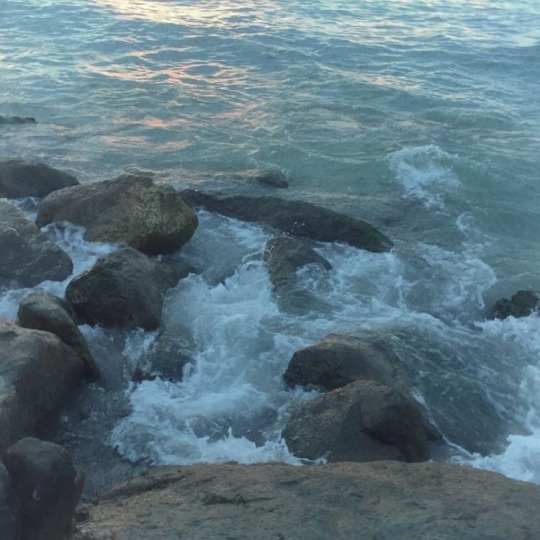


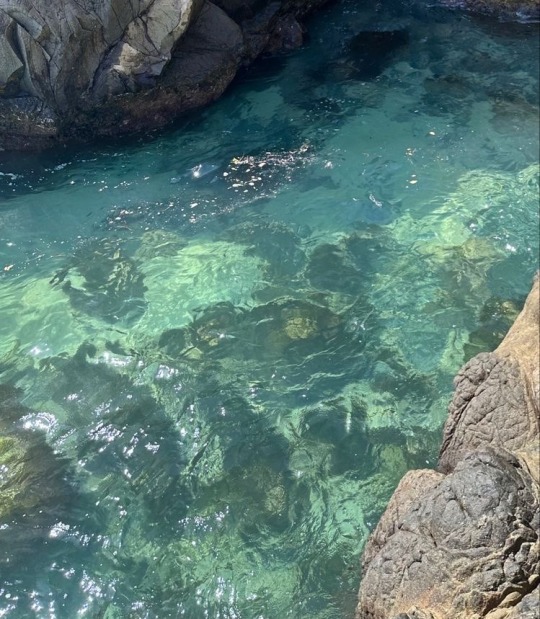





Selkie Jake au:
Bradley coming home after a mission, being on a vacation, someplace near beach, a nice villa belonging to uncle Ice (in this au he lives with his uncle Ice after he lost his parents in a car accident) and one day walking idly on beach, early morning, he finds a beautiful boy wandering alone, a bewildered look on his face and he tries to run away from Bradley when he sees him and he stumbles on a rock and accidently hurts his ankle which Bradley has to carry him to his house for patching him up. This lovely stranger doesn't let go of Bradley, nuzzling him, hooking his arms around his neck and not letting go (Bradley has to work while the stranger has a death grip on his shirt hehe) so after that he tries to talk to him, makes him eat something or just take a shower. He wraps the boy in blankets, scrambles up something for him to eat and then sits with him. He think Jake's one of locals that just maybe hurt himself and can't remember something until Jake curls himself around Bradley and says his name in low voice.
Jake stays a few days at Bradley's house and during this time Bradley finds out he's from sea and had lost his selkie coat and without that he can't return to his sea family. 🦭🦭🦭
He takes Jake to beautiful places he knows around the area and Jake actually comes out to enjoy and love being with humans. Till that day Bradley accidently sees a white mink coat exactly how Jake described in one of local stores. Saying one of fishermen found it on the shore.
He buys coat but hides it from Jake because, well, wouldn't you fall in love with a beautiful, lovely, cute sea creature in a week and so? While that said person is spending whole day actually hanging of you in any sort and asking for cuddles and nuzzles?
It's been a month when Jake finds the coat (right when at time he was about to tell Bradley he's in love with him and he wants him to be his mate💗) he thinks Bradley stole then hid the coat on intention to keep Jake for himself so he wears the coat and runs away 🥀
Tagging; @mvgnvsvntimvjoris @redfurrycat dear friends who listened to me talking about this au and wanted to be tagged💖
#oh and when Brad finds him he's naked yxhdgxg should I add it??#can't decide for ending but if you have any thought please add it or dunno just accept this angst ending I'm giving ya 😅#hangman x rooster#top gun maverick#hangster#sereshaw#bradley rooster bradshaw#jake hangman seresin#au post#i guess#mmm..#au posting
65 notes
·
View notes
Text
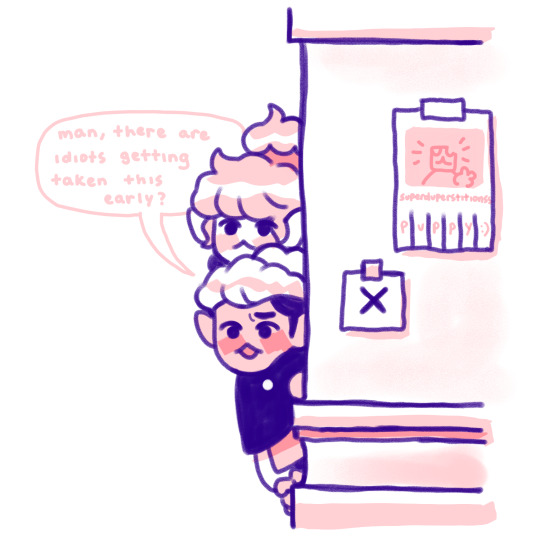
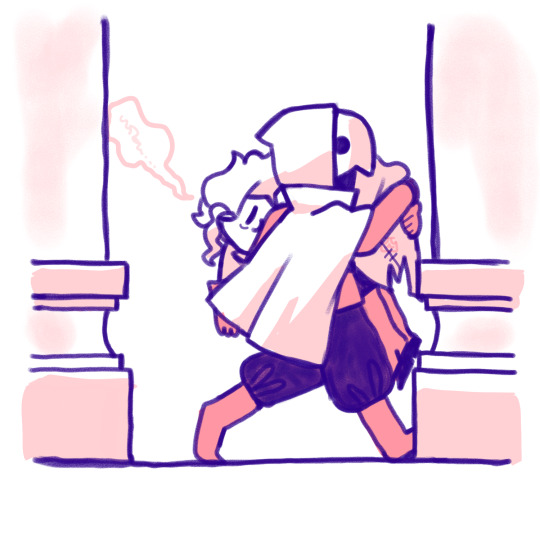

I want to believe this is how they found Hunter
#the owl house#toh#labyrinth runners#toh 2b#the owl house spoilers#SJHDHHS I’m sorry but the fact that it cuts to hunter waking up after being rescued is so funny to me#like ‘hey you. youre finally awake’#idk what else to add. very sweet that they got the E.E. to advocate for him :) like ‘mom come pick me up I’m scared’ energy#someone pointed out that bump looked in willows direction when saying the E.E was responsible for getting hunter and guessed willow might#have been the one to bring it up. which makes sense bc she’s the captain and I assume she and hunter kept talking on pensta after asias#very cute :’) we were also right abt hunter continuing to call willow ‘captain’.. altho for me I thought it was along the lines of being#raised in the emperors coven. so he’s addressing her as his superior but like we also know he kind of has a crush on her? this kid has so#many issues to work out. please let him be ok by the end of the show omg#AND SOMEONE POINTED OUT HE GETS QUIET AS OPPOSED TO HOW MUCH HE TALKS IN ANY OTHER SETTING. THATS SO CUTE I-#god I fucking love this episode. love all these kids and my boy BUMP IM SO HAPPY TO SEE HIM LETS GOOOO#my art#myart#toh spoilers#the owl house season 2#labyrinth runners spoilers#toh skara#toh viney#toh hunter#toh fanart#the owl house fanart#fanart#comic
542 notes
·
View notes
Text
I literally just do not understand how full grown ass adults go thru life like this. 0 self reflection. 0 concern about the impact of their behaviours on others. Continuing said behaviours even when they're pointed out as hurtful. Like????
#the duality of fran#idk its like the every few months i realize i sort of forgive my parents#bc things could be much worse#and they didnt MEAN to be hurtful. theyre just immature and selfish#they're not deliberately being like that#like their behaviour comes from a place of hurt and insecurity#and Yet its been pointed out SOOOO many times how bad it has affected me#and theyre always so guilt trippy woe is me when it's brought up#and maybe theyre trying. but honestly folks???? I DONT SEE ANY PROGRESS#like I cant cut them off i need somewhere to live + need somewhere to fall back on#once i move out. in case yknow. financial disaster (sh we are not thinking about my fears of financial instability that they left me with)#but like. ffs. ffs yall. I AM SO ANGRY#AND HURT#and im tired of being angry and hurt about stuff that isnt ever going to CHANGE#its a wound you know is there but it vant ever heal it just. prods and prods and prods#like the tldr of u can have a severely traumatizing shitty upbringing without ur parents being actually abusive#and it just adds this extra layer of guilt and complicated feelings on top of it all#like#please. just get a fuckin divorce. oh my god. also maybe dont have four kids while barely above the poverty line.#and then harp on your kids for every single perceived flaw or financial burden they incur. just. yknow. a thought
16 notes
·
View notes
Text
You know the fixation is getting bad when you start making crossovers in ur head 😞 anyway if Herbert West were a half-blood I think he’d either be a child of Athena (for obvious reasons) or Adonis, because Adonis is the god of rebirth (though it’s not what he’s most known for), and his kids have to ability to charmspeak, which fits with Herbert’s manipulative behaviour throughout the films (srsly there’s only so many times that I can defend Dan choosing to stay with him jfc).
Also he’d probably be there year-round due to the fact that he grew up in the foster system in canon, provided that they didn’t spend a week around him and realize that he’s an absolute freak of course.
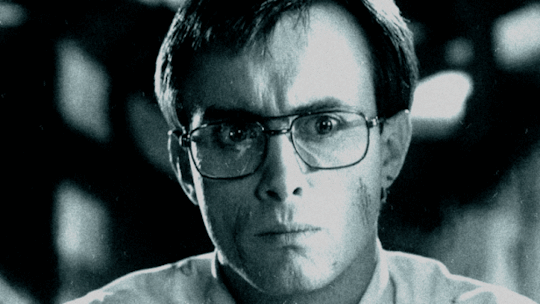
#reanimator#reanimator 1985#re animator#herbert west#camp half blood#percy jackson#pjo#I should mention that I haven’t been a Pjo fan for that long so if there’s anything that doesn’t line up with the lore or whatever ignore it#if you have any thoughts to add#please do#like who Dans godly parent would be or smth#or other Jcombs characters bc why not#jeffrey combs#jcombs#💉posting#rambling<3
14 notes
·
View notes
Text
Something I’m super excited to see be elaborated on in the DLC are all those loose ends left in the Scarlet/Violet book, and I’ve had an insane number of ideas pinging around my skull like a game of pong trying to piece everything together so please bear with me for a sec.
The most interesting page in the Scarlet/Violet book for me is the “Phantom Memory” excerpt, where Heath writes this:

I can’t really decipher anything from the sketches, but from what I can guess, I’d say that the diagram in the top left is either a detailed reconstruction of the third legendary’s hexagonal shell plates or a possible inspiration for Sada and Turo’s Tera Orbs.
But onto the most interesting part of this page: Heath’s conversation with an unknown second party in a location he claimed resembled “a dream”. Whoever he spoke with, they made absolutely sure that he left with the information on that page, whatever it may be, even going as far as to—assumedly—borrow his body and write it down for him.
This page isn’t the only one to mention Heath’s separation from the research team, though:
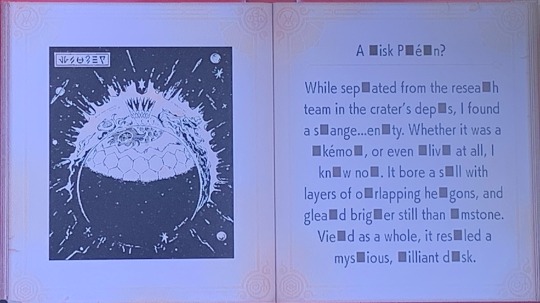
“A Disk Pokèmon?: While separated from the research team in the crater’s depths, I found a strange…entity. Whether it was a Pokèmon, or even alive at all, I know not. It bore a shell with layers of overlapping hexagons, and gleamed brighter still than gemstone. Viewed as a whole, it resembled a mysterious, brilliant disk.”
Heath mentions that the entity he encountered prior to falling unconscious doesn’t appear to be alive, and this distinction leads me to think that this creature—most likely the third legendary—is who he spoke with during his out-of-body experience. And like I mentioned earlier, for some reason this entity wanted him to leave Area Zero with information relating to the terastallization phenomenon, which is directly tied to energy being exuded by the crystals in the Great Crater of Paldea. Similar to how Eternatus discharged Galar particles that could be used for Dynamaxing, this third legendary is the root of this energy. Which leads me into my next thought:



The “This energy can alter the function of living things…” part in particular is what caught my eye. This energy affects organic life as a whole, not just Pokèmon, who terastallize; so then what effects do humans experience under these same circumstances? Does it relate back to Heath’s loss of memory/consciousness and him suddenly having that unexplained page of information?
I think it does, because Heath isn’t the only person who may have inexplicably garnered knowledge due to the crystals:


I originally interpreted this piece of dialogue as “Humans don’t have the technology or energy necessary to accommodate such a technological leap quite yet”, but the AI’s use of “knowledge” implies its a lack of intelligence that’s the problem. Therefore, it’s suggested that after being exposed to the crystals, Sada and Turo suddenly had the intellect required to craft the most advanced AI ever produced. I wonder if they experienced something similar to Heath and spoke with the same unfamiliar entity that he did. In the first research lab base, you can find the first of the professor’s journals in which they actually refer to the entity by name; it’s scrubbed out, though.
The history classes also have some tid-bits that may relate back to this topic too. Raifort mentions in one of her lectures that after researchers discovered terstallized Pokèmon in Area Zero, they tried to bring them to the surface; once they brought them all the way back up, though, the crystal had vanished. So terastallizing was only possible down in Area Zero, where the energy was concentrated and easily accessible. That was 87 years ago; now in the present day, not only can terastallized Pokèmon be found wandering Paldea, but whole swathes of crystals are forming above ground due to energy leaks from Area Zero. I don’t think it’s ever stated when terastallizing began to occur outside of the crater, but I’m curious if Sada and Turo’s invention of the Tera Orbs—or the construction of the time machine—may be connected.
And that’s not all; the crystals’ relation to time travel is also significant, as alluded by Arven’s dialogue in the post-game, when he’s going through his parent’s research articles in the academy lobby (I don’t have screenshots, unfortunately). Somehow, prior to and independent of the time machine, Paradox Pokèmon have been appearing in Area Zero and Area Zero only. Additionally, the AI brings up that the Great Crater is shrouded by a barrier of some kind, a barrier that a few Paradox Pokèmon have managed to breach, such as Great Tusks and Iron Treads. I assume the Disk Pokèmon is able to traverse time to some degree, whether it be seeing through the past and future or—like a time-related version of Hoopa—dragging specimens through time to the present.
Finally, all of this culminates into this question: for what reason would the third legendary need to impart knowledge about it’s own power to humanity’s brightest? I think it ties back to another page in the Scarlet/Violet Book:
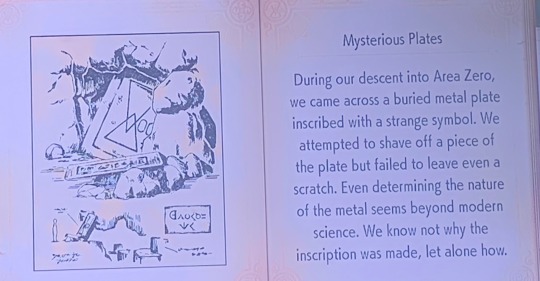
These metal plates are scattered throughout Area Zero, and they keep reminding me of the stakes trapping the Paldean Treasure legendaries up on the surface. They can’t be destroyed easily, and the metal that they’re made out of wasn’t able to be identified by Heath and his team.
So, my theory is this: the Disk Pokèmon, for whatever reason (possible ecological collapse?), was confined to the deepest part of Area Zero. The metal plates dispersed around the site conduct the unseen barrier surrounding the Great Crater, and its this barrier that keeps the entity imprisoned; chances are, the legendary’s own power was harnessed against it and used as a source to fuel the barrier. However, Paradox Pokèmon—some of them, at least—are able to circumvent it and break through, and as the AI states, if enough Pokèmon do, the barrier will shatter. The Disk Pokèmon was likely weakened by the plates, though; it’s only able to bring so many Paradox Pokèmon into Area Zero at a time. In order to escape, it’ll need outside help, and through it’s gift of foresight it knows that a human—one blinded by a dream of paradise—will be key to destroying the barrier surrounding the crater. All it needs to do is pull some strings: give Heath the necessary information about the crystals to publish in his Scarlet/Violet Book, thus introducing the means by which the time machine + Tera Orbs can be built and stoking the professor’s interest in the crater; “introduce itself” once the professor is down in Area Zero to start research for the Tera Orb project, allowing them to further understand where this energy originates; and offer its insight to the professor after their team and research/romantic partner leaves them on their own to build the time machine—it too dreams of paradise, a paradise where it can be free, and so its willing to offer knowledge in exchange for their dream to come true. Through the Tera Orbs and the construction of the time machine, energy is being expelled from Area Zero, which then means the plates have less to power the barrier. And with each Paradox Pokèmon that is brought to the present through the time machine, the barrier is able to keep less and less from slipping through. With a brittle barrier and an influx of Paradox Pokèmon, the Disk Pokèmon is set to escape…until you shut down the Paradise Protection Protocol, and it’s seemingly game over. But with control over time and abstract communication, the legendary isn’t short of options: maybe it would pull the deceased professor into the present from the past to finish what they started? Maybe it would try to communicate with the other parent and research partner, the one that left? Or, maybe it tries to reach out to you, the player, and tricks you into releasing it? In short, I need more of that “human + legendary Pokèmon cooperate for a common interest” villain dynamic.
Is it way too plot-heavy and definitely farfetched for a DLC? Oh definitely, but the idea of an immaterial legendary Pokèmon taking advantage of humanity’s thirst for knowledge in order to free itself or achieve some other motive sounds sick and now I’m obsessed with it.
#i can only hope that any of this makes sense lmao#there’s probably other details and stuff that i’ve missed (like the paradox suicune and virizion) but my brain is FRIED#feel free to add on i am starving for other people’s thoughts on this kind of stuff#pokemon#pokemon scarlet and violet spoilers#sv spoilers#pokemon spoilers#professor turo#professor sada#catch me running back to delete this post once the dlc comes out so i don’t look like a dumbass#i’m writing this on mobile and the read more automatically adds on to long posts#if it doesn’t please let me know; you guys shouldn’t have to scroll through this monster ahsjsjf
67 notes
·
View notes
Text
Curious about this, so I’m conducting a little anthropological study:
#the race is on the games have begun#I know my thoughts on the matter but I’m curious to see the results#also if you have any specific thoughts or input please add it in the tags! I’m super curious#star wars#the clone wars#sw#tcw#clone wars#captain rex#clone trooper rex#the bad batch#tbb#bleached rex poll#Polls#andis thought geyser
16 notes
·
View notes
Text
Sooner or later I've gotta make a better post regarding the appropriation of indigenous terminology by proponents of (certain kinds of) Welsh nationalism. But for now here's a very whistle-stop version of that post. I have a degree in Celtic Studies so these topics are very near and dear to my heart.
[Note: I wrote this post originally during a migraine. I'm revisiting the draft while I'm ill but hopefully can fix this up into something somewhat understandable. As always, this is only a very brief description of the history and I strongly reccomend reading about these topics in your own time to develop a deeper understanding of them. These are topics not even well known in Britain, but if you can spend a short time just to read this, you can help to combat misinformation about British (particularly Welsh) history - and that could aid in preventing the misappropriation of history in the long run. Diolch eto for reading!]
Very often, (certain) Welsh nationalists use terminology that positions the Welsh as if they are an 'indigenous' population who have been 'colonised'. They use language (which in this climate) heavily draws upon the language typically used for peoples who are the victims of British colonialism (of which Wales was an active participant). There's multiple issues with this and many of them lie in whether its appropriate to use this language (regardless of its accuracy or not) as a country which was actively involved in the colonisation of much of the world. What I mean in short is that additional language is needed which doesn't step on the toes of endangered cultures and groups directly affected by British colonialism.
Wales not only participated in British colonialism as a whole (alongside Scotland, Ireland* and England) but itself colonised parts of patagonia in Argentina.
I can't think of any similar terminology to 'indigenous' or 'colonised' which would also get the idea which is meant across. 'Native' in certain contexts is permissible, e.g. 'native speaker' in the context of a Welsh speaker. But in other contexts other than langauge, things get tricky when you argue 'nativeness' (this is a topic I will come back to - especially re. Celtic as a language descriptor vs Celtic as a so-called ethnicity). When (certain) Welsh nationalists talk about being 'indigenous' , being 'native' or 'colonised' what is meant by that?

(Map of the expansion of the Bronze Age Bell Beaker culture circa 2400 BC in Britain and Ireland) - from this map
What makes a Welsh person 'indigenous' to this island that doesn't immediately disqualify other peoples who also have a deep history here? Historically, the island of Britain has been lived on by many, many peoples.
In the Bronze Age you had the arrival of the Bell Beaker people. Then in the Iron-Age, you had tribes speaking (mostly) Brittonic. I say mostly, because we have direct evidence that in the Iron Age Gaulish speaking tribes also moved to parts of Britain but later became integrated with the rest of the population (which, I will add, were not a united peoples but a scattering of different groups who often went to war against each other). Then the Romans invaded Britain (and much of Western Europe) and over time integrated into the local population. So now Britain is Romano-British. Eventually the Western Roman Empire collapses and Britain enters into the sub-Roman Britain phase of its existence. Kingdoms begin to form, with the population speaking Brittonic and British-Latin. So you have different kingdoms in (what would become Wales) and in (what would become Northern England and Southern Scotland) you have more Brittonic-speaking kingdoms.
These kingdoms were also not a united peoples. They shared a language - but it's like claiming that Ancient Greeks were a united people simply because they all spoke Greek. Sparta, Athens, Cornith etc. were independent of each other and the same is true of the kingdoms of the Hen Ogledd (the Old North) and the kingdoms of Wales. They all had a common language but also went to war with each other sometimes. Eventually, the Brittonic language began to diverge into different languages. Namely, Old Welsh and Cumbric (the language spoken in what is today Cumbria, Lancashire, Northumberland and Southern Scotland). The two languages were still very closely related but had diverged by a certain point.
At the same time this is happening, Anglo-Saxons begin to arrive in what is now Kent. They form kingdoms and the Britons living there are either displaced or become absorbed into the Anglo-Saxon populace. Then the Norse rock up and conduct viking raids around the coast before finally settling in parts of the country and forming their own territories.
So now Britain has several groups living on the island (keeping in mind even before settlement from the Anglo-Saxons and the Norse that the British kingdoms were already composed of different groups themselves). Northern Scotland was also having a time re: Picts, Gaels and Britons - but we'll gloss over that for brevity. Also, Ireland was also raiding the Welsh coast at this time too.
Then the Normans rock up and in 1066 William the Conqueror, well, conquers. More history happens after this point but I will try and keep this as brief and as non-messy as I can.
So, to recap:
One of the earliest cultures in Britain was the Bell Beaker people in the Bronze Age. They had their lands settled by the Iron Age Britons ('Celts'). Then the Romans came and the 'Celts' became Romano-Britons. After the Western Roman Empire collapses the remaining population forms kingdoms with distinct political identities. These kingdoms eventually find themselves fighting the Anglo-Saxons and the Norse. Then the Normans turn up and so on and so forth.
So- which group is the original native group to Britain? (Trick question - this question cannot be satisfactorily answered in favour of one group without leaning into claims of historicity which the other groups can also claim).
Which brings me to modern Welsh identity and those who came before.
Something I see in Welsh nationalist groups is a claim to the legacy (or even claims of direct descendance from) the Iron Age Britons (commonly called Celts for shorthand, but as I said before I'm gonna get back to that point). And this narrative is what the "Welsh people are native to Britain" argument is based off of.
It may seem like #praxis to argue the Welsh people are the true inhabitants of Britain and the English are evil invaders. But you have to make *several* logical leaps to get to that point if you're genuinely arguing that point.
For starters, many more people than just the Britons (read: Romano Britons/early Brittonic kingdoms) have called Britain home since the Early Middle Ages. For example, there's the settlement of Scotland by the Gaels, the Irish settlement of certain parts of costal Wales. You have (much later) Roma and traveller groups, Jewish diaspora and many more diverse cultures and peoples existing in Britain at this time. The Romano-British population, which developed into the Early Middle Ages kingdoms of Wales and the Hen Ogledd, was also multicultural. Many black Romans started families with white Britons. By the sub-Roman period, Britain was ethnically and culturally diverse.
But those who argue in favour of a such thing as 'Celtic ethnicity' in order to support the idea Britons (and only Britons) were native to these islands typically imagine that history as white. White Brits, white Romans, white Gaels. When we know this isn't true. Did you know that the Northernmost Ancient Egyptian temple in the world is in Yorkshire because Roman Egyptians in the military brought their religion with them? Mary Beard did a fantastic documentary about a Roman Soldier from modern day Syria who was stationed at Hadrian's Wall who started a family with a British woman. Point is, that some people like to imagine a purely white Britain that they can pine for. And I'm afraid it simply isn't true. The version of history many white supremacists look to simply didn't exist.
I'll quickly bring up one last point before I draw this to a close. And it's about Celtic as a linguistic term vs Celtic as a so-called ethnicity. You see, any first year Celtic Student would tell you that there is no such thing as 'Celts'. Crazy, I know from people studying *Celtic* studies. But hear me out - there is good reasoning why (beyond language groups) Celtic is not a good term for describing an ethnic group. Much of it relates to what I've already mentioned, but we categorise Ireland, Scotland, Wales, Mann, Cornwall and Brittany as Celtic not because of the ethnicity of the people living there (which I've mentioned is pretty diverse) but because they are all places where Celtic languages are spoken. It wasn't until Edward Llwyd (d. 1709) that the term Celtic was coined to describe these languages. Up until that point, nobody was thinking of Irish and Welsh as related because the languages do not sound like they have a common origin. By extension, people didn't think of the Welsh and Irish as being the same peoples (or Celtic) either. Its only in the modern day there is a sense of Celtic identity. The Iron Age Britons were not going around calling themselves Celts. There was no common Celtic identity. But very often people argue Celticness based on a pseudohistory which insists on a false and misleading interpretation of history. Whether or not Celticness exists now is a different matter entirely. But it sure does not rest upon race or ethnicity as a qualifier. This is quite foundational stuff to first year and above Celtic Scholars, but is not generally well known outside of academia because the misinformation is quite strong. So if you read is far, diolch mawr and please share this with anyone you think might be interested in it. Any amount of knowledge of these things would greatly improve understanding of what it means to be Welsh and what it means to speak a Celtic language.
Lastly,
all of that begs us to ask the question:
What does it mean to claim nativeness in a Western European context?
More under the cut
What does it mean to claim nativeness in a Western European context? Especially in a Western Europe post-colonialism.
It means, to me, to claim what isn't our right to claim. To argue and make our points with language that isn't ours and isn't designed to be ours. That this language of indigeneity may sound appealing, but is it improper to use this terminology when our country was directly responsible for the atrocities in which this very language became relevant?
What do we do in response to the misinterpretation of our culture instead of relying on language of indigeneity? These are the questions I want to leave you with and invite you to share your thoughts on. How do we build a Wales which advocates for itself without relying upon inaccurate language which betrays a reliance upon the ahistorical to make its point?
What kind of Wales do we want to live in?
#cymraeg#welsh#cymru#cymry#cymblr#Wales#welsh language#welsh nationalism#nationalism#indigeneity#?#white supremacist mention#white nationalism cw#please add on if you have any thoughts on the matter - I'd love to hear other's takes on the topic!#this post was also mostly made when I was ill/had a migraine so it may not be perfect#but gets most of what I want across well enough I think
101 notes
·
View notes